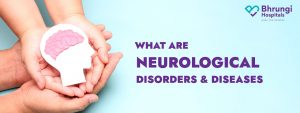
The human body is a gift! Its incredible functions, which get made up of complex yet incredible systems, have even perplexed doctors and scientists. One such system is the human body’s neurological system. Our body, which is made up of billions of nerve cells or neurons, performs various voluntary and involuntary activities that assist us daily.
However, if the neurological system is compromised, a person may have difficulty moving, speaking, swallowing, breathing, or learning. There are over 600 neurologic diseases, according to doctors, including Huntington’s disease, migraines, degenerative diseases, epilepsy, brain tumors, and meningitis, to name a few. Therefore, the neurological condition can significantly impact the patient’s life and the lives of those close to them.
The burden of neurological disorders-related deaths and disability is increasingly recognized as a global public health challenge. Moreover, its burden gets expected to rise over the next few decades as the population ages.
Mortality
In 2019, regionwide Neurological conditions accounted for:
- 533,172 deaths, 213,129 (40%) in men, and 320,043 (60%) in women.
- 32.9 deaths per 100,000 population (age-standardized), 33.1 deaths per 100,000 population in men and 32.2 deaths per 100,000 population in women.
| Total neurological disorder DALYs | Contributors |
| stroke | (37·9% [29·9-46·1] |
| headache disorders | (17·5% [3·6-32·5] |
| epilepsy | (11·3% [9·0-14·3] |
| cerebral palsy | (5·7% [4·2-7·7]) |
| encephalitis | (5·3% [3·7-8·9] |
Symptoms of 5 Neurological Disorders and Diseases
If you are not aware of such symptoms, carefully read the list and never ignore these 5 Neurological symptoms:
Pain
It is one of the most common neurological disease symptoms. Individuals may experience various types of pain, such as back pain, neck pain, or muscle and joint pain. Chronic headaches are one of the neurological symptoms. In some cases, chronic pain may result from an age-related change. However, it is impossible to ignore the possibility that it is a sign pointing to a problem in the nervous system.
Difficulties with Memory
Suppose a person has difficulty remembering information due to a lack of concentration, Agnosia, a progressive neurological disease. Because the individual cannot focus on what is being said, they will be unable to process the information and thus will not remember anything.
Numbness
Numbness, or a partial or complete loss of sensation, is another symptom. In such a situation, the person cannot feel any sense, whether it is related to touch, pain, vibration, or temperature. So, they may be unable to use their body parts correctly, resulting in difficulties with balance, coordination, walking, driving, or performing other physical work.
Sleep Issues
Sleep issues, like numbness, are linked to neurological symptoms. Insomnia and hypersomnia are two well-known sleep disorders that can have severe consequences for your health. While insomnia prevents you from sleeping, hypersomnia causes you to sleep excessively. In addition, anxiety, which is another symptom of neurological disorders, develops due to these disorders.
Partial or complete loss of vision
When the brain’s occipital lobe, which controls vision, is damaged, a person may experience partial or complete vision loss. This neurological vision impairment gets characterized by symptoms such as blurry or hazy vision, double vision, photophobia (fear of bright light), and so on. An individual is also unable to perceive and interpret their surroundings, making it difficult for them to interact with others.
Here you have answers to your questions
Which is the most common neurological disorder?
Epilepsy is the most common severe brain disorder worldwide, affecting people of all ages, races, social classes, countries, and regions.
Are blood tests capable of detecting neurological disorders?
Blood tests can measure the concentrations of therapeutic drugs used to treat epilepsy and other neurological disorders. In addition, urine analysis can reveal toxins, abnormal metabolic substances, disease-causing proteins, or signs of certain infections.
Is it probable for stress to cause neurological problems?
Symptoms of functional neurologic disorders may appear abruptly following a stressful event or with emotional or physical trauma.
What percentage of the population suffers from neurological disorders?
Up to 1 billion people, or nearly one-sixth of the world’s population, suffer from neurological disorders ranging from Alzheimer’s and Parkinson’s disease to strokes, multiple sclerosis, and epilepsy, as well as migraine, brain injuries, and neuro infections, with 6.8 million deaths each year.
We, at Bhrungi Hospital, believe in an approach that ensures the right care for the patient at the very first time itself in terms of diagnosis, therapies and outcomes for Brain, spine and nervous system disorders. In order to successfully accomplish this, accurate diagnosis plays a key role. Our neurologists work closely with radiologists who are trained in the use of innovative and highly advanced imaging technologies, to precisely pinpoint the cause of the signs and symptoms being displayed by the patient. The team then evaluates the results, assessing the problem from all perspectives, before coming up with a comprehensive, tailor-made treatment plan that perfectly meets the patient’s needs.








